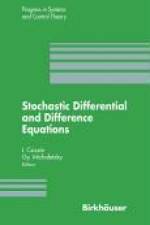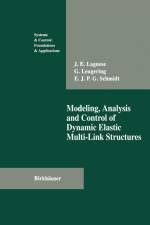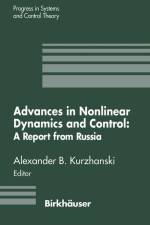Bøger i Progress in Systems and Contro serien
-
912,95 kr. Periodically Correlated Solutions to a Class of Stochastic Difference Equations.- On Nonlinear SDE'S whose Densities Evolve in a Finite-Dimensional Family.- Composition of Skeletons and Support Theorems.- Invariant Measure for a Wave Equation on a Riemannian Manifold.- Ergodic Distributed Control for Parameter Dependent Stochastic Semilinear Systems.- Dirichlet Forms, Caccioppoli Sets and the Skorohod Equation Masatoshi Fukushima.- Rate of Convergence of Moments of Spall's SPSA Method.- General Setting for Stochastic Processes Associated with Quantum Fields.- On a Class of Semilinear Stochastic Partial Differential Equations.- Parallel Numerical Solution of a Class of Volterra Integro-Differential Equations.- On the Laws of the Oseledets Spaces of Linear Stochastic Differential Equations.- On Stationarity of Additive Bilinear State-space Representation of Time Series.- On Convergence of Approximations of Ito-Volterra Equations.- Non-isotropic Ornstein-Uhlenbeck Process and White Noise Analysis.- Stochastic Processes with Independent Increments on a Lie Group and their Selfsimilar Properties.- Optimal Damping of Forced Oscillations Discrete-time Systems by Output Feedback.- Forecast of Lévy's Brownian Motion as the Observation Domain Undergoes Deformation.- A Maximal Inequality for the Skorohod Integral.- On the Kinematics of Stochastic Mechanics.- Stochastic Equations in Formal Mappings.- On Fisher's Information Matrix of an ARMA Process.- Statistical Analysis of Nonlinear and NonGaussian Time Series.- Bilinear Stochastic Systems with Long Range Dependence in Continuous Time.- On Support Theorems for Stochastic Nonlinear Partial Differential Equations.- Excitation and Performance in Continuous-time Stochastic Adaptive LQ-control.- Invariant Measures for Diffusion Processes in Conuclear Spaces.- Degree Theory on Wiener Space and an Application to a Class of SPDEs.- On the Interacting Measure-Valued Branching Processes.
- Bog
- 912,95 kr.
-
912,95 kr. I. Introduction.- 1. General Overview.- 2. On the Contents of the Book.- II. Modeling of Networks of Elastic Strings.- 1. Modeling of Nonlinear Elastic Strings.- 2. Networks of Nonlinear Elastic Strings.- 3. Linearization.- 4. Well-posedness of the Network Equations.- 5. Controllability of Networks of Elastic Strings.- 5.1. Exact Controllability of Tree Networks.- 5.2. Lack of Controllability for Networks with Closed Circuits.- 6. Stabilizability of String Networks.- 7. String Networks with Masses at the Nodes.- III. Networks of Thermoelastic Beams.- 1. Modeling of a Thin Thermoelastic Curved Beam.- 2. The Equations of Motion.- 2.1. Some Remarks on Warping and Torsion.- 3. Rotating Beams.- 3.1. Dynamic Stiffening.- 4. Straight, Untwisted, Nonshearable Nonlinear 3-d Beams.- 4.1. Approximation-Generalizations.- 5. Straight, Untwisted Shearable Linear 3-d Beams.- 6. Shearable Nonlinear 2-d Beams with Curvature.- 6.1. Approximation-Generalizations.- 7. A List of Beam Models.- Damping.- 8. Networks of Beams.- 8.1. Geometric Joint Conditions.- 8.1.1. Rigid Joints.- 8.1.2. Pinned Joints.- 8.2. Dynamic Joint Conditions.- 8.2.1. Rigid Joints.- 8.2.2. Pinned Joints.- 9. Rotating Two-link Flexible Nonlinear Shearable Beams.- IV. A General Hyperbolic Model for Networks.- 1. The General Model.- 2. Some Special Cases.- 2.1. String Networks.- 2.2. Networks of Planar Timoshenko Beams.- 2.4. Networks of Initially Curved Bresse Beams.- 2.5. Beams and Strings.- 3. Existence and Regularity of Solutions.- 4. Energy Estimates for Hyperbolic Systems.- 5. Exact Controllability of the Network Model.- 6. Stabilizability of the Network Model.- V. Spectral Analysis and Numerical Simulations.- 1. Preliminaries.- 1.1. Notation.- 1.2. Networks of Strings.- 1.3. Networks of Timoshenko Beams.- 1.4. Networks of Euler-Bernoulli Beams.- 2. Eigenvalue Problems for Networks of 1-d Elements.- 2.1. Introduction.- 2.2. General String Networks.- 2.3. Homogeneous String Networks.- 2.3.1. Examples.- 2.4. Networks of Timoshenko Beams.- 2.4.1. The Case Where ? =0.- 2.4.2. The Case Where ? Belongs to an Individual Beam.- 2.4.3. Eigenvalues for the Entire Graph.- 2.5. Homogeneous Timoshenko Networks.- 3. Numerical Simulations of Controlled 1-d Networks.- 3.1. Introductory Remarks.- 3.2. Networks of Strings.- 3.2.1. Absorbing Controls.- 3.2.2. Directing Controls.- 4. Finite Element Approximations of Timoshenko Networks.- 5. Implicit Runge-Kutta Method: Dry Friction at Joints.- VI. Interconnected Membranes.- 1. Modeling of Dynamic Nonlinear Elastic Membranes.- 1.1. Equations of Motion.- 1.2. Edge Conditions.- 1.3. Hamilton's Principle.- 2. Systems of Interconnected Elastic Membranes.- 2.1. Geometric Junction Conditions.- 2.2. Dynamic Conditions.- 2.3. Linearization.- 2.4. Well-Posedness of the Linear Model.- 3. Controllability of Linked Isotropic Membranes.- 3.1. Observability Estimates for the Homogeneous Problem.- 3.2. A Priori Estimates for Serially Connected Membranes.- 3.3. A Priori Estimates for Single Jointed Membrane Systems.- 3.4. The Reachable States.- 3.4.1. Serially Connected Membranes.- 3.4.2. Membrane Transmission Problems.- VII. Systems of Linked Plates.- 1. Modeling of Dynamic Nonlinear Elastic Plates.- 1.1. Equations of Motion.- 1.2. Edge Conditions.- 1.3. Hamilton's Principle.- 1.4. Additional Kinematic and Material Assumptions.- 1.5. Rotations Associated with Plate Deformation.- 2. Linearization.- 2.1. Linearization of Equations of Motion.- 2.2. Linearization of Edge Conditions.- 2.3. Hamilton's Principle for the Reissner Model.- 2.4. Linearization of the Vector Rotation Angle.- 2.5. The Kirchhoff Plate Model.- 3. Systems of Linked Reissner Plates.- 3.1. Geometric Junction Conditions.- 3.2. Linearization of the Geometric Joint Conditions.- 3.3. Dynamic Joint Conditions.- 3.3.1. Dynamic conditions at a connected joint.- 3.3.2. Dynamic conditions at a hinged joint.- 3.3.3. Dynamic conditions at a semi-rigid joint.- 3.3.4. Dynamic conditions at a rigid join...
- Bog
- 912,95 kr.
-
912,95 kr. The Decomposition of Controlled Dynamic Systems.- A Differential Game for the Minimax of a Positional Functional.- Global Methods in Optimal Control Theory.- On the Theory of Trajectory Tubes - a Mathematical Formalism for Uncertain Dynamics, Viability and Control.- A Theory of Generalized Solutions to First-Order PDEs with an Emphasis on Differential Games.- Adaptivity and Robustness in Automatic Control Systems.
- Bog
- 912,95 kr.



